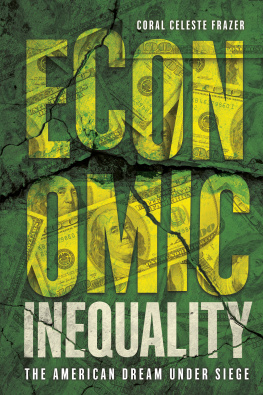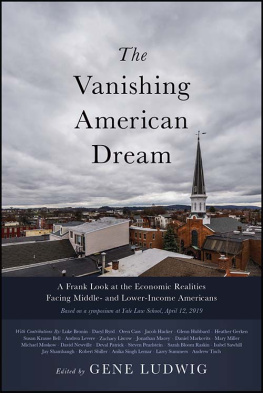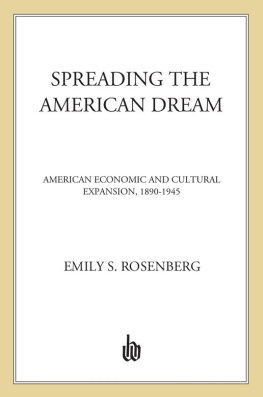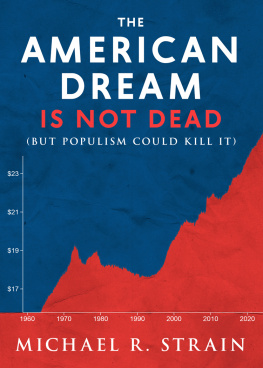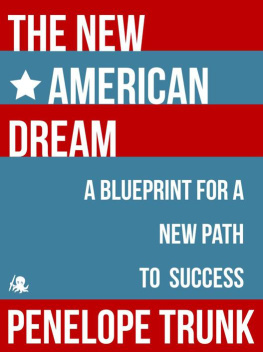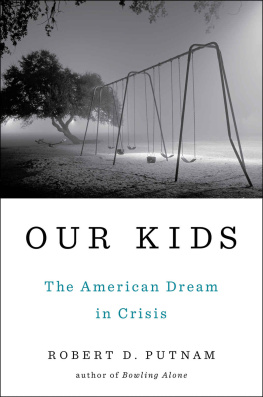Copyright 2018
THE BROOKINGS INSTITUTION
1775 Massachusetts Avenue, N.W., Washington, D.C. 20036
www.brookings.edu
All rights reserved. No part of this publication may be reproduced or transmitted in any form or by any means without permission in writing from the Brookings Institution Press.
The Brookings Institution is a private nonprofit organization devoted to research, education, and publication on important issues of domestic and foreign policy. Its principal purpose is to bring the highest quality independent research and analysis to bear on current and emerging policy problems. Interpretations or conclusions in Brookings publications should be understood to be solely those of the authors.
Library of Congress Cataloging-in-Publication Data
Names: Hecht, Bennett L., 1959 author.
Title: Reclaiming the American dream : proven solutions for creating economic opportunity for all / Ben Hecht.
Description: Washington, D.C. : Brookings Institution Press, [2018] | Includes bibliographical references and index.
Identifiers: LCCN 2018012375 (print) | LCCN 2018013518 (ebook) | ISBN 9780815734895 (ebook) | ISBN 9780815734888 (pbk. : alk. paper)
Subjects: LCSH: United StatesEconomic conditions2009 | United StatesEconomic policy2009 | United StatesSocial policy1993 | EqualityUnited States.
Classification: LCC HC106.84 (ebook) | LCC HC106.84 .H43 2018 (print) | DDC 330.973dc23
LC record available at https://lccn.loc.gov/2018012375
ISBN 978-0-8157-3488-8 (pbk. : alkaline paper)
ISBN 978-0-8157-3489-5 (ebook)
Typeset in Electra
Composition by Westchester Publishing Services
For Joseph C. & Phyllis Hecht
The American Dream is that dream of a land in which life should be better and richer and fuller for everyone, with opportunity for each according to ability or achievement. A dream of social order in which each man and each woman shall be able to attain to the fullest stature of which they are innately capable, and be recognized by others for what they are, regardless of the fortuitous circumstances of birth or position.
James Truslow Adams, The Epic of America
What is key to Americas understanding of class is the persistent beliefdespite all evidence to the contrarythat anyone, with the proper discipline and drive, can move from a lower class to a higher class.
Michelle Alexander, The New Jim Crow: Mass Incarceration in the Age of Colorblindness
They took our coal out of here and everybody got rich on it. And what did we get? We got black lung. We dont have good water to drink, we dont have roads, we dont have anything except a bunch of broken down old coal miners thats forgotten.
Jerry Blackburn, retired Virginia coal miner
O, yes, I say it plain, America never was America to me,
And yet I swear this oathAmerica will be!
Langston Hughes, Let America Be America Again
ACKNOWLEDGMENTS
I want to thank and acknowledge all the people who helped to make this book a reality. I am especially indebted to the Rockefeller Foundations Bellagio Center Residency Program for providing me with a month-long fellowship in June 2016. This book would not have been completed but for my time there, the supportive environment, incredible workspace, and inspiration and mentoring by the other Bellagio fellows. Never having had a month just to work on one project before, I want to give special thanks to Professor Barbara Prainsack, who began her fellowship on the same day that I did, and who helped me to develop an approach and discipline for using my time there to its fullest.
Oscar Perry Abelo, Alyssa Campbell, Lexie Frosh, Claire Huttenlocher, Joseph Lee, Alex Leibovitz, Megan McGlinchey, Hila Mehr, Annie Pope, and Mary Schletzbaumall provided me with the research that I used in Bellagio and after. I am incredibly grateful especially for the efforts of Megan McGlinchey, who began working in 2016 as a summer intern at Living Cities in Washington, D.C., while I was in Italy. Taking advantage of the time difference between Italy and the United States, I would send Megan research requests before I would go to sleep, and her answers or proposed text would magically appear sometime the next day. When she became a full-time employee that fall, Megan helped me turn the promising product of my fellowship into this final book. It wouldnt have been possible without her tireless help, constant good nature, and overall guidance.
Special thanks to all of the people who opened their doors to me and spent time explaining and detailing their work including, in alphabetical order:
Mayor Steve Adler, Tony Aguilar, Julian Alssid, Matthew Baer, Ross Baird, Ben Berkowitz, Clara Brenner, Jordan Brown, Kesha Cash, Charlie Catlett, Nikia Clarke, Susan Crawford, Harold DePriest, Mike Dinkin, Derek Douglas, Jeanine Duncliffe, Jackie Dyess, Martin Eakes, Dave Edinger, Jeff Edmondson, Tom Esselman, Sharon Feigon, Mayor Greg Fischer, Julia Fischer, Kelly Fitzsimmons, Danny Gardner, Brett Goldstein, Marek Gootman, Joanna Harries, Glenn Harris, Fred Hurtz, Letetia Jackson, Nigel Jacob, Daniel King, Patrick Kirwan, Kelly Kline, Sheryl Lane, Julie Lenzer Kirk, Jon Li, Greg Lindsey, Amy Liu, Lula Luu, Sabrina Manville, David Martinez, Mayor Ben McAdams, Noelle Melton, Brad Miller, Kay Mooney, Jay Nath, JaNay Queen Nazaire, Julie Nelson, Orlando Ochoa, Jennifer Ong, Jen Pahlka, Mike Papineau, Karina Quintana, Rip Rapson, Ben Rattray, Timothy Renick, Theresa Reno-Weber, David Rose, Eric Rosengren, Hollie Russon Gilman, Mary Jane Ryan, Zoe Schlag, Marlene Seltzer, Susan Shaheen, Alexander Shermansong, Luis Silos, Ben Sio, Libby Smiley, Ted Smith, Jake Solomon, Jamez Staples, Robin Steffen, Martin Sundquist, Greg Tehven, Terri Thao, Harriet Tregoning, Joel Vargas, James Weinberg, Joseph Weisbord, Charles West, Todd Williams, Detra Wright, Ellen Wu, Nancy Zimpher, and Ashley Zuelke.
Many, many people at Living Cities have helped to make this book a reality. Nadia Owusu encouraged me early on to turn my rantings and observations into a book that others could benefit from. Elodie Baquerot, Ellen Ward, and Jessica Fontaine all have helped me in ways too numerous to mention. The Living Cities board wholeheartedly supported my thirty-day fellowship and is helping to promote the book. Thank you.
I also want to acknowledge and thank my wife, Lynn Leibovitz, and my children, Eliza and Sam, for their love, patience, and support. Their reality checks on my work have always made it and me better.
INTRODUCTION
My grandparents came to this country at the turn of the twentieth century with absolutely nothing. My parents grew up poor with them. Drafted by the Army at nineteen, my father left his home in Brooklyn to fight in World War II. When he returned, the GI bill enabled him to become the first in his family to graduate college. In 1962, when I was three years old, he got his doctorate from New York University, a professorship at a small, New Jersey public college, and a $22,000 house with a backyard in the suburbs. My family was living the American Dream.
This ideal, first articulated by James Truslow Adams in 1931, of an upwardly mobile land in which life should be better, richer and fuller for everyone, with opportunity for each according to ability certainly has had incredible staying power in the history of our nation and in the hearts and minds of the American people. In fact, by the 1970s, this dream had largely come true for millions of Americans, like my parents and me. Gaps between whites and blacks, and low-, middle- and upper-income Americans, were narrower than they had ever been in terms of income, wealth, and college attainment.




